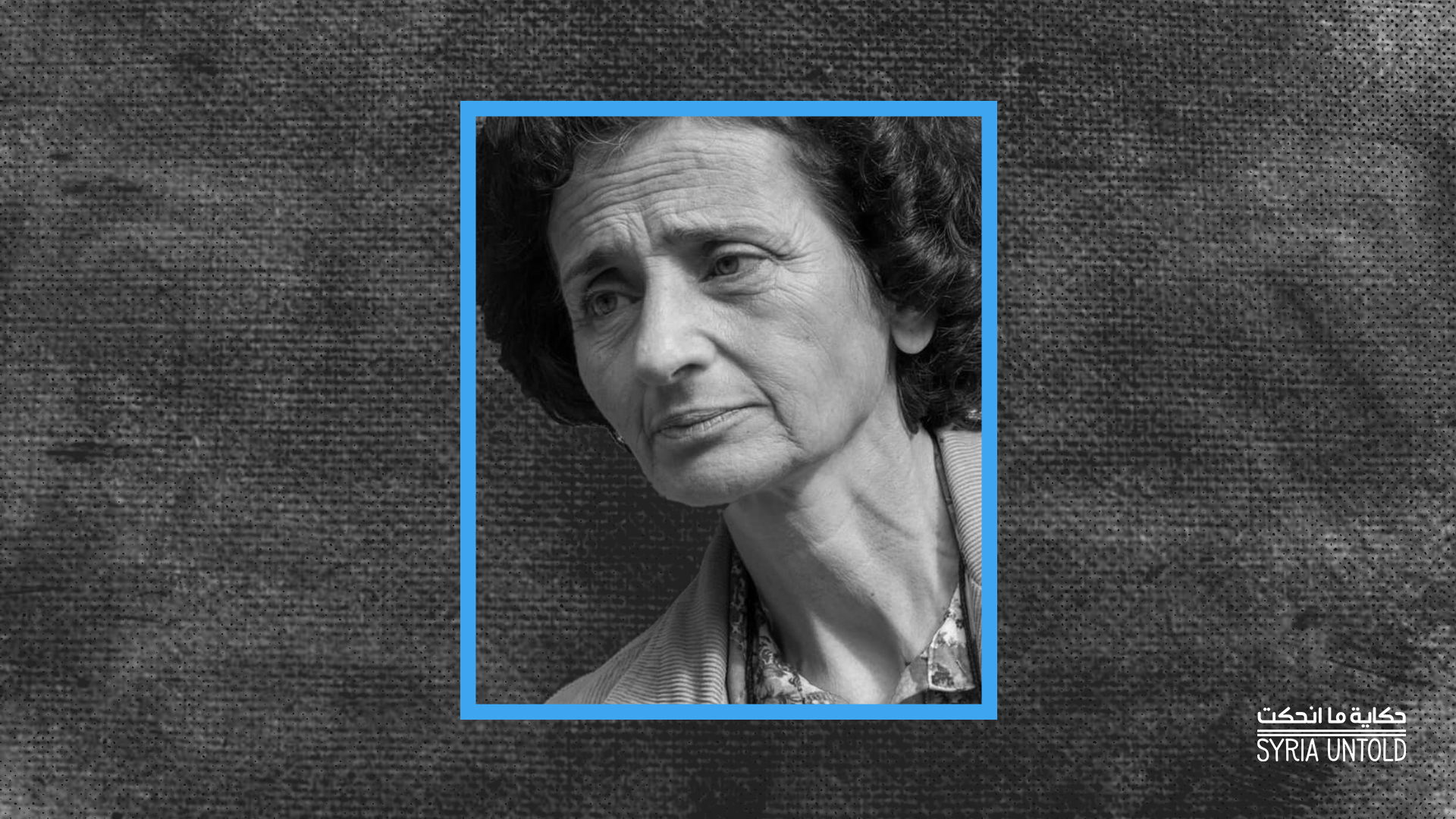“She is a bride with no husband but the people who walk with freedom, seeking the blessing of patriotism beneath their flag’s sky. Her marriage contract is penned with the ink of both reason and heart.”
-Mary Ajami
In an old Damascene house, in the Jowaniyeh neighborhood’s Talaa al-Fidha alley behind the St. John of Damascus Orthodox Church, Mary Ajami was born in 1888. She would go on to live a long life in service of literature, journalism and, of course, feminism until her death in 1965.
Ajami is perhaps the most famous Syrian feminist of the modern era. Hundreds of articles have been written about her as well as several books. She has even been depicted in television series for her important and foundational role in Syrian cultural and social life of the early 1900s, a role that played out in her poems, articles and other activities, not least her founding of the magazine al-Arous (The Bride), among the first Arab feminist periodicals. Ajami also co-founded the Shami Women’s Club, a group that advocated for equal rights.
Randa Baath: 'Any cultural act is vital'
12 March 2021
Hala Abdullah: 'I believe in cinema as a means of resistance’
11 June 2021
Al-Arous
In 1910, the Ottoman Empire’s waning days, Mary Ajami founded al-Arous in Alexandria, Egypt (though some sources say she first started the magazine in Homs). From there, she moved the magazine’s headquarters to her home city Damascus. Al-Arous started at 32 pages, then grew to 40 pages before it was forced to shut down in 1914 due to the outbreak of World War I.
The magazine returned to print after the war’s end in 1918 at 60 pages, filled with writing by the most famous literary figures in Syria and the Arab world at the time, from Gibran Khalil Gibran to Mikhail Naimy, Elia Abu Madi, Maruf al-Rusafi and Abbas Mahmoud al-Aqqad. Al-Arous continued publication until 1925, when it halted due to pressures during the Great Syrian Revolt.
The magazine aimed to “liberate women from their shackles and men from their ungratefulness.” Within its pages were works of literature, history and nature writing, as well as articles about children and the family. There were episodic novels and literary debates; in all, the magazine was a unique platform for ideas about liberation.
Mary Ajami wrote in her introduction to the first issue of al-Arous: “Women have been granted the honor of adorning the earth with the flowers of heaven.” Addressing her female readers, she added: “You are the bride. Welcome her without being commanded to do so, such that she may be freed of her shame, that she may reveal the secrets of her heart, of her soul and the ceremonies of her standing. She is a bride with no husband but the people who walk with freedom, seeking the blessing of patriotism beneath their flag’s sky. Her marriage contract is penned with the ink of both reason and heart, crowning heads with blossoms of hope and love.”
The Shami Women’s Club
Mary Ajami founded the Shami Women’s Club in 1920 alongside Syrian feminist Nazik al-Abid, naming the group after the Arabic word for Damascus, al-Sham. Abid was a leader of the Syrian women’s movement and demanded equal political and social rights for women. She had earlier founded the Red Star Society, which served as the core of the Syrian Red Crescent.
He is the peasant farmer. If not for his struggle, the basil wouldn’t show its signs of beauty.
The club included women from wealthy Damascene families, and mainly aimed at liberating women from the conservative social restraints of the time. Members wanted to obtain full political, legal and social rights as well as to free Syrian society in general from the web of occupations over the country. The club held numerous literary salons.
The Shami Women’s Club became one of a series of women’s organizations active in major Syrian cities at the time that were concerned with literature, politics and the role of women in society. These groups formed what became known as the “first wave” of Syrian feminism.
From Ottoman Syria to Argentina
02 August 2021
The forgotten railways of Syria and Lebanon: Tales of a missed connection
29 October 2021
Mary Ajami the activist
Ajami was known for butting heads with the Ottoman authorities, and after them the French and English occupation forces. As the stories go, she stood up to the infamous Ottoman military commander Djemal Pasha “al-Saffah” (the Butcher, as he was nicknamed by Syrians) to defend the rights of national activists—not least her fiance and literary agent Petro Pauli. Pauli was later arrested and executed on May 6, 1916.
Much has already been said about Mary Ajami and her struggle against occupation authorities. But her struggle was not limited to fighting against these oppressive systems. Rather, she also advocated for the rights of different classes within society, particularly women and children.
She also supported Syrian farmers and workers, and pushed towards supporting the local economy rather than relying on foreign imports. This “inward orientation” was not typical of the Syrian elite and bourgeoisie at the time, who looked toward Europe as a model of civilization.
However, this leftist leaning did not attract the attention of historians and others who studied Mary Ajami’s life, despite her having made her beliefs clear in her poem “The Peasant’s Hope,” which won the first prize on BBC radio in London in 1947. She wrote:
He is the peasant farmer. If not for his struggle,
the basil wouldn’t show its signs of beauty.
He is the heavily burdened bulwark
Upon whose face are the flames of torches.
A lonely death
In the last years of her life, Ajami was gripped by illness. She retreated from the public advocacy through which she had worked and struggled for decades to obtain equality for women and other mistreated members of society.
She died on December 25, 1965, and was buried in the St. George Greek Orthodox Church in Damascus’ Bab al-Sharqi neighborhood.
Ajami had spent her life in service of the freedom and dignity of Syrians of all walks of life, and yet she did not receive that love in return. Only 16 people attended her funeral and gathered as she was brought to her grave to finally be laid to rest.








